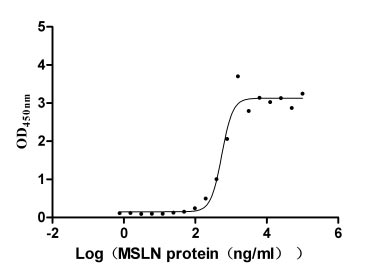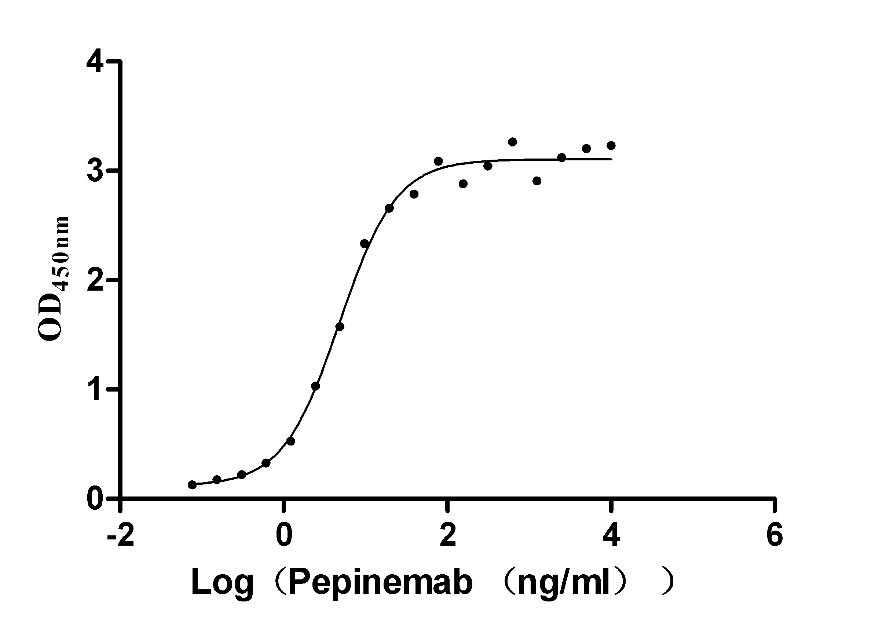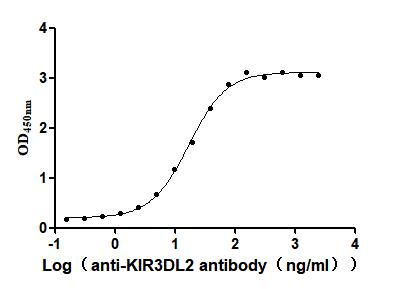Recombinant Mouse CCN family member 1 (Ccn1)
-
货号:CSB-BP006463MO
-
规格:
-
来源:Baculovirus
-
其他:
-
货号:CSB-EP006463MO-B
-
规格:
-
来源:E.coli
-
共轭:Avi-tag Biotinylated
E. coli biotin ligase (BirA) is highly specific in covalently attaching biotin to the 15 amino acid AviTag peptide. This recombinant protein was biotinylated in vivo by AviTag-BirA technology, which method is BriA catalyzes amide linkage between the biotin and the specific lysine of the AviTag.
-
其他:
-
货号:CSB-MP006463MO
-
规格:
-
来源:Mammalian cell
-
其他:
产品详情
-
纯度:Greater than 85% as determined by SDS-PAGE.
-
基因名:Name:Cyr61Synonyms:Ccn1, Igfbp10
-
Uniprot No.:
-
别名:Ccn1; Cyr61; Igfbp10; CCN family member 1; 3CH61; Cellular communication network factor 1; Cysteine-rich angiogenic inducer 61; Insulin-like growth factor-binding protein 10; IBP-10; IGF-binding protein 10; IGFBP-10; Protein CYR61
-
种属:Mus musculus (Mouse)
-
蛋白长度:Full Length of Mature Protein
-
表达区域:25-379
-
氨基酸序列TCPAAC HCPLEAPKCA PGVGLVRDGC GCCKVCAKQL NEDCSKTQPC DHTKGLECNF GASSTALKGI CRAQSEGRPC EYNSRIYQNG ESFQPNCKHQ CTCIDGAVGC IPLCPQELSL PNLGCPNPRL VKVSGQCCEE WVCDEDSIKD SLDDQDDLLG LDASEVELTR NNELIAIGKG SSLKRLPVFG TEPRVLFNPL HAHGQKCIVQ TTSWSQCSKS CGTGISTRVT NDNPECRLVK ETRICEVRPC GQPVYSSLKK GKKCSKTKKS PEPVRFTYAG CSSVKKYRPK YCGSCVDGRC CTPLQTRTVK MRFRCEDGEM FSKNVMMIQS CKCNYNCPHP NEASFRLYSL FNDIHKFRD
-
蛋白标签:Tag type will be determined during the manufacturing process.
The tag type will be determined during production process. If you have specified tag type, please tell us and we will develop the specified tag preferentially. -
产品提供形式:Lyophilized powder
Note: We will preferentially ship the format that we have in stock, however, if you have any special requirement for the format, please remark your requirement when placing the order, we will prepare according to your demand. -
复溶:We recommend that this vial be briefly centrifuged prior to opening to bring the contents to the bottom. Please reconstitute protein in deionized sterile water to a concentration of 0.1-1.0 mg/mL.We recommend to add 5-50% of glycerol (final concentration) and aliquot for long-term storage at -20℃/-80℃. Our default final concentration of glycerol is 50%. Customers could use it as reference.
-
储存条件:Store at -20°C/-80°C upon receipt, aliquoting is necessary for mutiple use. Avoid repeated freeze-thaw cycles.
-
保质期:The shelf life is related to many factors, storage state, buffer ingredients, storage temperature and the stability of the protein itself.
Generally, the shelf life of liquid form is 6 months at -20°C/-80°C. The shelf life of lyophilized form is 12 months at -20°C/-80°C. -
货期:Delivery time may differ from different purchasing way or location, please kindly consult your local distributors for specific delivery time.Note: All of our proteins are default shipped with normal blue ice packs, if you request to ship with dry ice, please communicate with us in advance and extra fees will be charged.
-
注意事项:Repeated freezing and thawing is not recommended. Store working aliquots at 4°C for up to one week.
-
Datasheet :Please contact us to get it.
相关产品
靶点详情
-
功能:Promotes cell proliferation, chemotaxis, angiogenesis and cell adhesion. Appears to play a role in wound healing by up-regulating, in skin fibroblasts, the expression of a number of genes involved in angiogenesis, inflammation and matrix remodeling including VEGA-A, VEGA-C, MMP1, MMP3, TIMP1, uPA, PAI-1 and integrins alpha-3 and alpha-5. CCN1-mediated gene regulation is dependent on heparin-binding. Down-regulates the expression of alpha-1 and alpha-2 subunits of collagen type-1. Promotes cell adhesion and adhesive signaling through integrin alpha-6/beta-1, cell migration through integrin alpha-1/beta-5 and cell proliferation through integrin alpha-v/beta-3.
-
基因功能参考文献:
- These findings reveal a critical role for CCN1 in restoring mucosal homeostasis after intestinal injury PMID: 25807183
- CYR61 is upregulated in acute lung injury (ALI) and CYR61 overexpression exacerbates ALI in mice. PMID: 25713320
- CYR61 silencing can blunt the malignant behavior of osteosarcoma tumor cells by limiting primary tumor growth and dissemination process. PMID: 25065593
- Knock-in mice expressing a CCN1 mutant that is unable to bind alphavbeta5/alphavbeta3 were impaired in ductular reaction. CCN1, acting through its alphav beta3/alphav beta5 binding site, is critical for survival after bile duct ligation. PMID: 25822023
- Findings reveal that CCN1 plays a novel role in pathogen clearance; increasing macrophage infiltration and activation resulting in increased virus clearance in tumors. PMID: 24895995
- Extracellular Cyr61 convergence with growth factor signaling and integrin/FAK signaling is a new concept of growth factor-induced cell migration. PMID: 25623072
- These findings implicate CCN1 as a mediator of cardioprotection induced by G-protein coupled receptor agonists that activate RhoA/MRTF-A signaling. PMID: 25106095
- Our results here reveal a novel role of Cyr61 in the pathogenesis of rheumatoid arthritis PMID: 24517278
- Findings suggest that that cysteine-rich 61 protein (cyr61) is expressed in airway epithelial cells and has a positive correlation with eotaxin and number of airway infiltrating eosinophils. PMID: 24142710
- It provides evidence that CCN1 is released from activated platelets, suggesting that platelets constitute a novel source for CCN1 release to the circulation during sepsis. PMID: 24430538
- Binding of CYR61 to LFA-1, ICAM-1 and integrin alpha6 supports the adhesion of thymic epithelial cells and T-cell. PMID: 24280864
- these data reveal that de novo Cyr61 in the extracellular matrix bridges LPA and integrin pathways, which in turn, activate FAK, leading to cell migration. PMID: 24371135
- CCN1 protein expression is increased in aging skeletal muscle. PMID: 24196529
- The aim of the study was to evaluate CCN1 protein abundance and localization in the kidney of IL-6-deficient C57BL/6J (IL-6 KO) mice. PMID: 23690222
- Degradome products of the matricellular protein CCN1 as modulators of pathological angiogenesis in the retina. PMID: 23798676
- role of Cyr61 in obstructive kidney fibrosis PMID: 23457573
- the potential roles of CCN1 in the inflammation and macrophage infiltration of nonalcoholic fatty liver disease ( PMID: 23071295
- the matricellular protein CCN1/Cyr61 is a critical regulator of Sonic Hedgehog in pancreatic carcinogenesis PMID: 23027863
- The expressions of Cyr61, MMP-2, and VEGF at the levels of mRNA and protein were decreased in the QYHJ groups. PMID: 21382954
- a novel, VEGF-independent, clinically relevant, pro-angiogenic factor, CYR61, that is a transcriptional target of Hh-GLI signaling PMID: 22056874
- Cyr61 expression increases with tumor grade in human osteosarcoma and demonstrate that cyr61 silencing inhibits in vitro osteosarcoma cell invasion and migration as well as in vivo lung metastases in mice. PMID: 21312266
- newly identified functions of CCN1 suggest its possible therapeutic utility in ischemic retinopathy. PMID: 21212276
- extracellular matrix protein CCN1 dictates TNFalpha and FasL cytotoxicity PMID: 21153366
- Expression of Cyr61 is induced in fibroblasts through plasmin-induced activation of the protease-activated receptor-1 signaling pathway. PMID: 12231560
- These findings establish CYR61 as a novel and essential regulator of vascular development. PMID: 12446788
- Pressure overload, ischemia, & neurohormonal factors induce myocardial expression of CCN1, a potent proangiogenic factor. CCN1 may play an important role in the adaptation of the heart to cardiovascular stress. PMID: 15117851
- results identify a novel and functionally important binding site for integrin alphavbeta3 and provide a new approach for dissecting alphavbeta3-specific CCN1 functions both in cultured cells and in the organism PMID: 15308622
- CCN1 acts through integrin alpha6beta1 and heparan sulfate proteoglycans (HSPGs) to promote specific functions in fibroblasts. PMID: 15322081
- Ccn1-null mice are impaired in cardiac valvuloseptal morphogenesis, resulting in severe atrioventricular septal defects. PMID: 17023674
- Constitutively active rhFOXO3a gene transduction suppressed rmCYR61 expression in rat VSMC. Suppression of CYR61 is among several mechanisms by which FOXO3a inhibits VSMC proliferation and neointimal hyperplasia. PMID: 17234971
- Intracolonic overexpression of CCN1 induced angiogenesis in mouse colon. PMID: 18599605
- Caveolin-1 (cav-1)/Cyr61 interaction via integrins represents a novel pathway of Cyr61 signaling involving cav-1-dependent processes, which play a critical role in regulating hyperoxia-induced cell death PMID: 18801924
- Fas-dependent hepatic apoptosis induced by an agonistic monoclonal anti-Fas antibody or intragastric administration of alcohol is severely blunted in knock-in mice expressing an apoptosis-defective Ccn1 allele. PMID: 19364818
- Data suggest that signal-controlled activation of SRF, MRTF-A, and CBP provides a novel connection between mechanical stimuli and CCN1 gene expression. PMID: 19542562
- The Cyr61 protein, a product of a growth factor-inducible immediate-early gene, regulates chondrogenesis in mouse limb bud mesenchymal cells. PMID: 9441684
- Study shows that the interplay between CYR61-CTGF-NOV1 (CCN1) and Wnt5a in endothelial cells and pericytes determines the angiogenic outcome in a model of ischemic retinopathy. Data highlight the significance of CCN1-EC and CCN1-pericyte communication signals in driving physiological and pathological angiogenesis. PMID: 28469167
- Mechanical cyclic stretch led to increased Cyr61 mRNA and protein expression, mobilized NF-kappaB from the cytoplasm to the nucleus and increased IL-8 secretion in A549 cells. PMID: 30128877
- Study describes how cysteine-rich 61 (CCN1) promotes monocyte migration by upregulating monocyte chemoattractant protein-1 (CCL2) expression in osteoblasts in rheumatoid arthritis (RA) disease. CCN1 could serve as a potential target for RA treatment. PMID: 28341837
- Blocking or knockdown CCN1 expression ameliorated skin inflammation and reduced the expression of CCL20 in both imiquimod and IL-23-induced psoriasis-like mouse models. PMID: 28602508
- refine the leukocyte recruitment cascade model by introducing endothelium-bound CCN1 as an inflammation mediator and by demonstrating a role for platelets and patrolling Ly6C(low) monocytes in acute vascular inflammation. PMID: 27482114
- This study is the first to describe how CCN1 promotes VEGF expression in osteoblasts and increased endothelial progenitor cells angiogenesis in rheumatoid arthritis disease. PMID: 27465842
- Data show that cysteine rich protein 61 protein (CCN1) critically mediates doxorubicin (DOX)-induced cardiotoxicity. PMID: 27167338
- Our results not only reveal a novel mechanism illustrating the role of Cyr61 in epidermis pathogenesis but also suggest that therapies targeting Cyr61 may represent a novel strategy in the treatment of psoriasis vulgaris. PMID: 27856305
- The LPA1-CCN1 axis may be the central control for SMC migration. PMID: 27760754
- these data suggest that the WNT/beta-catenin signaling pathway enhances pancreatic cancer development and malignancy in part via up-regulation of CYR61. PMID: 27889647
- Lysophosphatidic acid induced time-dependent phosphorylation of serum response factor and CRE-binding protein in in smooth muscle cells, inducing transcription of CCN1. PMID: 28157379
- Data show that Cysteine-rich 61 (CYR61) acts as a tumor-promoting gene in pancreatic neuroendocrine tumors. PMID: 26625209
- CCN1 is an important regulator of chondrocyte maturation during cartilage development and homeostasis. PMID: 26363286
- CCN1 exacerbates tracheal obliterative bronchiolitis by enhancing fibroproliferation via an alphavbeta3-integrin-independent pathway. PMID: 26174800
- Data show that RNA silencing of CCN family member 1 protein (CCN1) inhibits retinal neovascularization (RNV) by inhibiting phosphoinositide 3-kinase (PI3K)/AKT protein signaling in mouse pup model of oxygen-induced retinopathy (OIR). PMID: 26459773
显示更多
收起更多
-
亚细胞定位:Secreted.
-
蛋白家族:CCN family
-
组织特异性:Low in kidney, adrenal gland, testes, brain, and ovary, moderate in heart, uterus, and skeletal muscle, highest in lung.
-
数据库链接:
KEGG: mmu:16007
STRING: 10090.ENSMUSP00000029846
UniGene: Mm.1231
Most popular with customers
-
Recombinant Human Mucin-16 (MUC16), partial (Active)
Express system: Mammalian cell
Species: Homo sapiens (Human)
-
Recombinant Human Semaphorin-4D (SEMA4D), partial (Active)
Express system: Mammalian cell
Species: Homo sapiens (Human)
-
Recombinant Human Killer cell immunoglobulin-like receptor 3DL2 (KIR3DL2), partial (Active)
Express system: Mammalian cell
Species: Homo sapiens (Human)















